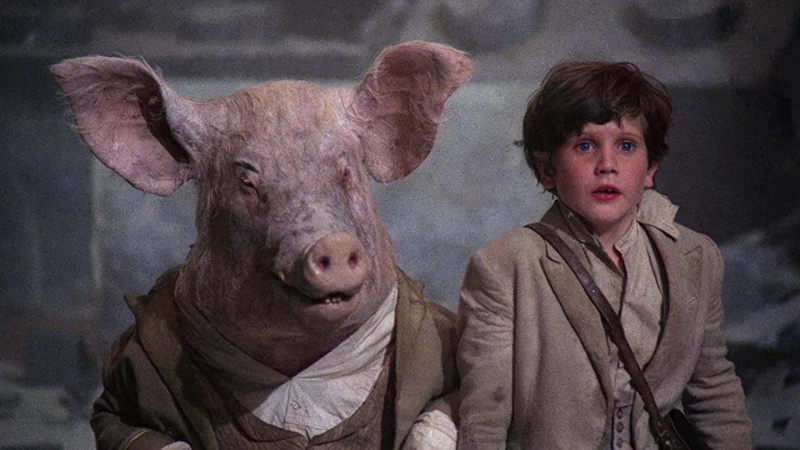




Although Time Bandits (1981) isn’t in the same league as Brazil (1985) and The Adventures of Baron Munchausen (1988), it nevertheless demonstrates Terry Gilliam’s inventiveness in the realm of family cinema. It doesn’t hurt that it features two members of Monty Python – John Cleese and Michael Palin, the latter the film’s co-writer – but Gilliam fertile enough in 1981 to create a zany adventure film, regardless of cast, location, or budget. And for a film with a budget of $5 million, the film ripples along with the might of a Hollywood epic, complete with an English flair.
The film opens on Kevin (Craig Warnock), a young boy fascinated with mythology, who is visited by knights and dwarves in his bedroom from a faraway land. Electing to join the dwarves on their journey, Kevin flits from time zone to time zone to profit his mind, and his pockets. Jumping from the Battle of Castiglione to the Titanic, Kevin’s greatest battle comes in the form of Evil (David Warner) who threatens to topple everything that is good and virtuous in the world. And by the time he returns to his parents, his interest in materialism has been replaced by something fierier in his life.
Time Bandits - like Raiders of The Lost Ark (Steven Spielberg), released in the same year – tests the boundaries of children’s entertainment, which includes a violent battle between the Minotaur and Agamemnon (played with handsome elegance by Sean Connery,) but it should be enjoyed by eight-year-olds looking for something with greater bite. Ten-year-olds will enjoy the shrill Shelley Duvall, crying over the Titanic harbour, just as fifteen-year-olds should get a kick out of the sparky dialogue between The Ogre (Peter Vaughan) and his wife (Katherine Helmond). “I think they thought I was a fantasist who made fantasies,” Gilliam recalled in 2023. “I don’t make films about fantasy. I make films about imagination. Those are very different things”.
Time Bandits is clearly a creative venture and opens with an animated sequence that quickly envelopes into live action. Former Beatle George Harrison contributed Dream Away, which was heard on the closing credits, which made sense considering Harrison’s interest in Gilliam’s work. What’s most apparent about the film is that it is supremely English – in humour, peculiarity, passion, and kitsch production style. The cast predominantly consists of British actors, from Ian Holm to Ralph Richardson (the latter playing God because “he was as close to God as actor’s get,”) and delves into the history taught across the British mainland (it’s hardly surprising that Ian Holm is depicted as portly and pugnacious, as he was in many texts across the French ocean).

Kevin is the emotional anchor of the film, steering parents away from technological gadgets and preaching goodness to a bunch of dwarves who travel the world in the hope of finding a pot of gold. Kevin is free of lust: His eyes widen whenever he walks through Nottingham Forest or admires the riches that surrounds him in ancient Greece. Connery took a pay cut to appear in the film, and the lack of budget is visible, but ever the inventor, Gilliam uses whatever props are at his disposal to create this insular world. Much like seeking treasures in Microgaming’s 9 Pots of Gold Slot Game, the dwarves journey for their elusive pot of gold. Gilliam would rely on playwrights Tom Stoppard and Charles McKeown to flesh out the stories on future projects, which explains Brazil’s emotional density and Baron Munchausen’s ambition. Compared to those two films, Time Bandits undoubtedly suffers from a lack of central narrative – Palin’s métier as a sketch artist might explain the feature’s loose nature – but it’s so tightly directed that the audiences don’t start questioning the film’s story until the credits roll. Modern audiences might be a little concerned with Holm’s over-the-top French accent, but like everything else in the film – the lack of CGI, the sprinklings of synthesised notes in the mix – it’s an affectation that was in keeping with the trappings of the time.
Unsurprisingly, Palin keeps many of the best lines for himself. “The problem has returned,” he cries out; “I must have fruit.” Palin would enjoy a meatier turn as Jack in Brazil and would later work closely with Cleese on A Fish Called Wanda (Charles Crichton, 1988). By all accounts, he was the Python’s lucky charm, or golden charm in this case, bringing good luck to Gilliam and Cleese on their solo projects. Had the film been made later, he probably would have played the “Evil Being” himself, but Palin’s brief appearance in the film is one of the funnier cameos in the work. The same cannot be said for Cleese, who hams it up as Robin Hood, flaunting his green tights to the camera. Sometimes, it doesn’t take three Pythons to make a film work. Often, it’s best to stick to two!






